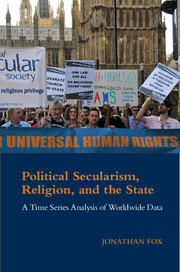Book contents
- Frontmatter
- Contents
- Acknowledgments
- 1 Introduction
- 2 Secularism or Secularization? The Secular-Religious Competition Perspective and Beyond
- 3 Establishment, Support, Neutrality, or Hostility: The Varieties of Official Religion Policy
- 4 State Support for Religion
- 5 Regulation, Restriction, and Control of the Majority Religion or All Religions
- 6 Religious Discrimination
- 7 Education, Abortion, and Proselytizing
- 8 Religion in Constitutions
- 9 Conclusions
- Appendix Data Collection and Reliability
- Bibliography
- Index
6 - Religious Discrimination
Published online by Cambridge University Press: 05 May 2015
- Frontmatter
- Contents
- Acknowledgments
- 1 Introduction
- 2 Secularism or Secularization? The Secular-Religious Competition Perspective and Beyond
- 3 Establishment, Support, Neutrality, or Hostility: The Varieties of Official Religion Policy
- 4 State Support for Religion
- 5 Regulation, Restriction, and Control of the Majority Religion or All Religions
- 6 Religious Discrimination
- 7 Education, Abortion, and Proselytizing
- 8 Religion in Constitutions
- 9 Conclusions
- Appendix Data Collection and Reliability
- Bibliography
- Index
Summary
Religious freedom has become an important international issue. It is the subject of major international treaties. About 9 in 10 constitutions across the world have language that protects religious freedom. Major government and multistate organizations such as the United States, the European Union, and the United Nations monitor religious freedom and produce reports on religious freedom around the world. It also receives significant attention by human rights organizations including Amnesty International and Human Rights without Frontiers.
Religious freedom can be defined as the right for everyone to be able to practice their religion as well as set up and maintain religious institutions without unreasonable interference from the government or other sources. The term unreasonable is an important qualification because every state in the world restricts religion in some manner. Take, for example, the ancient sect of the Baal that was native to modern-day Israel. This sect regularly practiced human sacrifice. Another sect, the Thugs, was native to India. Its religious practices included murdering innocents with a garrote (strangulation rope or wire) then mutilating the bodies. While to the best of my knowledge both of these sects are extinct, in the event there were any modern-day worshippers, no government would allow them to practice these rites. Even under religious auspices, murder remains murder.
US Supreme Court Chief Justice Morrison Waite succinctly explained this principle in the 1879 case Reynolds v. United States. He argues that the state may in some circumstances limit religious practices because to do otherwise “would be to make the professed doctrines of religious belief superior to the law of the land, and in effect to permit every citizen to become a law unto himself. Government could exist only in name under such circumstances.”
This chapter does not strictly focus on religious freedom. It focuses on religious discrimination. I define religious discrimination as limitations placed on the religious practices or institutions of minority religions that are not placed on the majority religion.
- Type
- Chapter
- Information
- Political Secularism, Religion, and the StateA Time Series Analysis of Worldwide Data, pp. 136 - 167Publisher: Cambridge University PressPrint publication year: 2015



